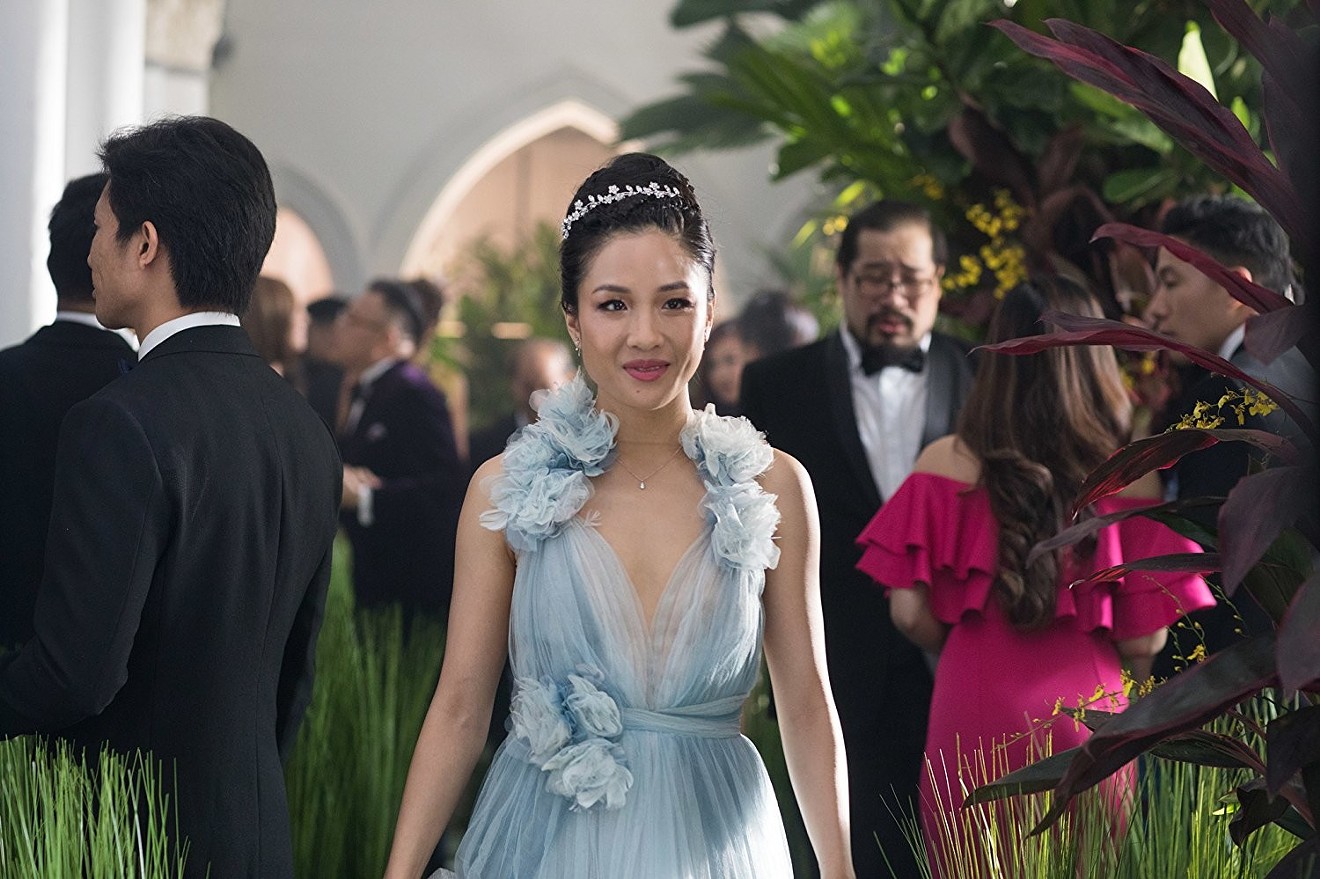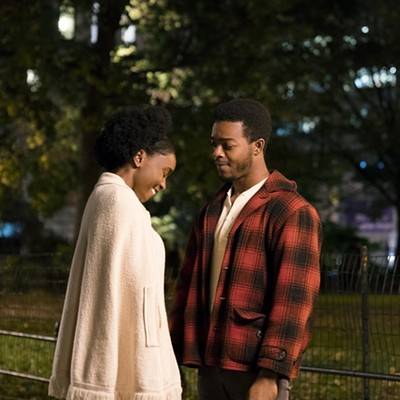Romantic comedies have resurfaced in critical consciousness, largely thanks to Asian creators (and despite steady production by black creators). For recent examples of the genre, think Kumail Nanjiani's The Big Sick, Aziz Ansari's Master of None and Mindy Kaling's The Mindy Project. Asians in America have gravitated toward that genre, partly to bask in its flights of fancy and desire — and, quietly, to challenge stereotypes of a submissive, homogenous group of robotic workers. Nowhere has that been more apparent than the anticipation of Jon M. Chu’s Crazy Rich Asians.
If romantic comedies traffic in romantic optimism, then the film Crazy Rich Asians, based on Kevin Kwan’s 2013 bestseller, hits all the right notes. Scandal ensues when the charming Nick Young (Henry Golding), secretly heir to a wealthy Chinese-Singaporean real estate fortune, brings his accomplished, lower-class Chinese-American girlfriend, Rachel Chu (Fresh Off The Boat’s Constance Wu), home for his best friend’s wedding.
Crazy Rich Asians is planted firmly in the realm of women and beauty. The obvious difference between the characters of Crazy Rich Asians and the characters of previous Asian-led films is the formers’ immense wealth. By that standard, Wu’s Rachel is not pretty, nor tall, nor well dressed enough to keep up with Nick’s life, necessitating a beloved, though sadistic rom-com staple: the makeover.
The opulence of the clothes and jewelry begins to take on the quality of an advertisement; of what and for whom is up for debate. But these images are too aware of the ones that have come before it; they’re diametrically opposed to stereotypes of Asians laboring or laundering clothes. This is especially true of Nick’s cousin Astrid (Gemma Chan), a Princess Diana-type, who at the start of the film purchases multimillion-dollar earrings that she hides from her lower-class husband Michael (played by an underutilized Pierre Png). The thrill of beauty is amped up to a hundred here, the riotous fun drowning out the social commentary.
While the film attempts to situate identity as its emotional heart, Rachel’s sense of self isn’t easily shaken. “I’m so Chinese, I’m an economics professor with lactose intolerance,” Rachel says when her free-spirited mother (Tan Kheng Hua) worries she’s too American for the old money. If Rachel does struggle with her identity, Chu’s pacing leaves little room to investigate these nuances. Instead, Wu is tasked with delivering sentimental monologues about her background in a believable way. When Nick’s mother Eleanor (Michelle Yeoh) and her mother-in-law (Lisa Lu) try to cast doubt on Rachel, by way of a long-buried family secret, the drama and subsequent fallout feel manufactured.
Rachel’s cat-and-mouse game to win Eleanor’s respect is the most enjoyable thread of the film, though, with Wu, earnest and scrappy, finding her complement in Yeoh’s reserved menace. At the top of a grand staircase in the Young family home, Eleanor confides her own difficulties with getting along with Nick’s grandmother. Towering over her, Eleanor delivers the final blow: “That is how I know you are not good enough for Nick” — Yeoh’s control cutting through the screen as Wu’s face falls.
In stark contrast, Nick’s father is absent for the entire movie, and most of the men, save for Nico Santos’ Oliver T’sein (the “rainbow sheep of the family”), are barely present. Golding does the best with what he’s given, but Nick is more symbol than person. He keeps a number of secrets from Rachel, but is never made to account for them. His grand gesture, procuring Eleanor’s engagement ring for Rachel, is indicative of Eleanor’s acceptance rather than his own comeuppance. That filmmakers agonized over casting a character who is essentially an impeccably dressed mannequin is more an indictment of white hegemonic tastemaking and its discomfort with Asian male desirability than anything else. (The casting of Golding, who is half-white, has drawn criticism from various groups, often dismissed as one of racial purity.)
Other archetypes offer more nuance. The sassy best friend, Goh Peik Lin, is played by rapper-actor Awkwafina, whose comedic timing is so impeccable, her co-option of AAVE frequently goes unmentioned. It is fortunate that her tiresome “blaccent,” still played for laughs, also offers deeper commentary on newly monied Singaporeans and the exportation of black American cool. The Goh house is a huge, gilded affair, vaguely inspired by Donald Trump’s bathroom. Rachel endures a lavish meal with the Gohs, in which Peik Lin’s father warns everyone to eat up because children are starving in America — an acknowledgement and dismissal of fears about Asian global dominance in a post-NAFTA world. Everything about the Gohs, from their Trumpian decor to Peik Lin’s mimicry, serves to connote something undesirable, standing in stark contrast to the Youngs’ pristine, ancient wealth, and offering a tantalizing peek into new strains of Singapore’s social stratification.
The most interesting moments in the film are also its most coy. Astrid suffers silently through her husband’s affair with another woman, ignited because her wealth makes him insecure. At the film’s close, she leaves him, donning the earrings she once hid. It speaks to the dismal state of Asian representation that this display is meant to be a moment of triumph and not ridicule. For all its carnival-like antics, Crazy Rich Asians is all too aware of its own spectacle.
Support Us
Houston's independent source of
local news and culture
account
- Welcome,
Insider - Login
- My Account
- My Newsletters
- Contribute
- Contact Us
- Sign out
Crazy Rich Asians Is the Latest Non-White Rom-Com That Basks in and Subverts Old Clichés
Alana Mohamed August 13, 2018 10:09AM

Constance Wu plays Rachel Chu, the Chinese-American girlfriend of charming Nick Young (Henry Golding), in Jon M. Chu’s Crazy Rich Asians, a romantic comedy that is based on Kevin Kwan’s 2013 bestseller.
Sanja Bucko/Courtesy of Warner Bros.
[
{
"name": "Related Stories / Support Us Combo",
"component": "11591218",
"insertPoint": "4",
"requiredCountToDisplay": "4"
},{
"name": "Air - Billboard - Inline Content",
"component": "11591214",
"insertPoint": "2/3",
"requiredCountToDisplay": "7"
},{
"name": "R1 - Beta - Mobile Only",
"component": "12287027",
"insertPoint": "8",
"requiredCountToDisplay": "8"
},{
"name": "Air - MediumRectangle - Inline Content - Mobile Display Size 2",
"component": "11591215",
"insertPoint": "12",
"requiredCountToDisplay": "12"
},{
"name": "Air - MediumRectangle - Inline Content - Mobile Display Size 2",
"component": "11591215",
"insertPoint": "4th",
"startingPoint": "16",
"requiredCountToDisplay": "12"
}
,{
"name": "RevContent - In Article",
"component": "12527128",
"insertPoint": "3/5",
"requiredCountToDisplay": "5"
}
]
KEEP THE HOUSTON PRESS FREE...
Since we started the Houston Press, it has been defined as the free, independent voice of Houston, and we'd like to keep it that way. With local media under siege, it's more important than ever for us to rally support behind funding our local journalism. You can help by participating in our "I Support" program, allowing us to keep offering readers access to our incisive coverage of local news, food and culture with no paywalls.
Trending Film
- International Film Festival 2000
- It’s Sadly Kind of Perfect That New Season of GLOW Is Stolen by Marc Maron
- Made in Houston
-
Sponsored Content From: [%sponsoredBy%]
[%title%]

Don't Miss Out
SIGN UP for the latest
news, free stuff and more!
Become a member to support the independent voice of Houston
and help keep the future of the Houston Press FREE
Use of this website constitutes acceptance of our
terms of use,
our cookies policy, and our
privacy policy
The Houston Press may earn a portion of sales from products & services purchased through links on our site from our
affiliate partners.
©2024
Houston Press, LP. All rights reserved.




